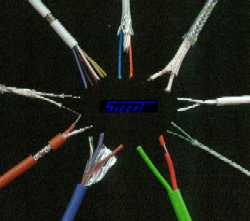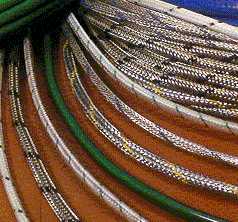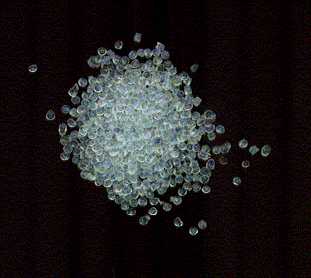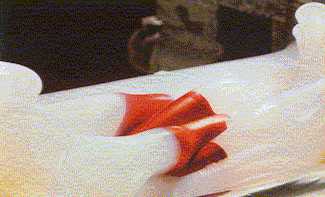From
1977 Siccet srl is a national and international company.
Company of
thermocouple, extension, compensating and signal cables
market.
Siccet is certified
ISO
9001:2000
Siccet design and produce a large range of
thermometric cables:
with insulation and jacket in pvc,
silicon rubber, fluorocarbon resin, glass and ceramic fibres
with technopolymer layer tape.
|
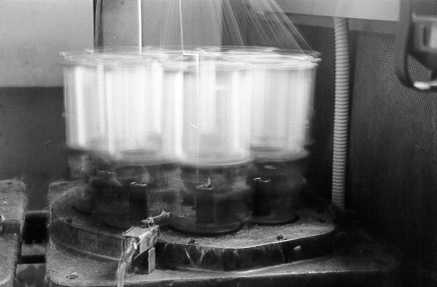
Glassfibre / lasikuitu
|
Pfa is a copolymer of tetrafluorethylene and perfluoralkyl vinil ether,is a compound of carbon atmos and fluorine atoms
Eristetty lasikuitutermopari
- Fibreglass insulated cables
- Working temperature +400 to +550 °C
- High temperature resistance
- Offers lower weight and smaller dimensions
- Fibreglass does not burn
- Flexible material
- The cables with glassfiber insulation show excellent
resistance to high temperatures,
good dielectrical characteristics and good flexibility,
with lower weights and dimensions.
They grant good resistance to mould and chemical
agents.
Glassfiber is fireproof.
Glassfiber is commonly adopted in applications to elevated temperatures,
frequently to
protect insulated cables, with the purpose of increase the duration of the
working time in
case of fire or of occasional increase of temperature.
Despite treatments of impregnation with varnishes or with liquid silicone rubbers,
fiberglass insulated cables (overlapped or braided) are not suitable for applications in
presence
of steam and or oil.
- Outer tin plated copper, stainless steel or galvanized
steel armour
improve mechanical and abrasion features of glassfiber insulated cables.
The cables isolated with glassfiber for high temperature type "R"
could be used
for temperature up to 550°C in accordance with the type of application.
For further
information about "R" glassfiber please contact our Customer Service.
- Glassfibre
-
- Model: VA-oval
-
- Fiberglass insulated, fiberglass overbraided cable
- Thermocouple, extension, compensating quality or RTD cable
- Insulation working temperature: +350 °C
- Insulation resistance: >20 Mohms/Km (measured at 1000 Volts dc - at 20°C)
- Reference standards
- IEC 584 parte 1,2,3
- DIN 43710 - DIN 43714
- ANSI MC96.1-1982
- CEI 20-11
-
- Construction
- Stranded conductors
- Insulation: braided fiberglass type "E"
- Impregnation: colour coded liquid silicone rubber
- Core laying-up: flat twin
- Inner braid:fiberglass type "E" - vinilic impregnation
- Cable end-form cross section: flat twin
Standard packing: 250 metres bound, loose (not spooled) coils
Normal minimum quanity to be ordered: 1'000 metres
- Model: VB
-
- Fiberglass insulated and tinplated copper armoured cables
- Thermocouple, extension, compensating quality or RTD cable
- Insulation working temperature: +250 °C
- Insulation resistance: >20 Mohms/Km (measured at 1000 Volts dc - at 20°C)
- Reference standards
- Iec 584 parte 1,2,3
- DIN 43710 - DIN 43714
- ANSI MC96.1-1982
- CEI 20-11
-
- Construction
- Stranded conductors
- Insulation: braided fiberglass type "E"
- Impregnation: colour coded liquid silicone rubber
- Core laying-up: twisted conductors with fiberglass filler
- Inner braid:
fiberglass type "E" - vinilic impregnation
- Outer armour: tinplated copper wire braid
- Cable end-form cross section: round cable
Standard packing: 250 metres bound, loose (not spooled) coils
Normal minimum quanity to be ordered: 1'000 metres
- Fluoropolymers
- FEP maximum working temperature +206 °C
- MFA maximum working temperature +240 °C
- PFA maximum working temperature +260 °C
- Overview
- Chemical inertness, non ageing characteristics, excellent
dielectric properties, heat resistance: exceptional properties that permit the use of
cables insulated with these products in many applications where other thermoplastic
material will not be usable.
-
- Heat stability
- Cables insulated with FEP, MFA or PFA can be used in a
wide temperature range; they retain good maechanical properties and flexibility even at
very low temperature (please see details in table below).
- When these products are exposed
to a naked flame, they burn but cease burning as soon as the flame is removed.
-
- Electrical properties
- Excellent electrical properties independent of
temperature or ageing.
-
- Resistance to chemicals
- Fluoropolymers show excellent resistance to corrosive
chemicals and inorganics chemicals, including inorganic bases, oxidizing acids, mineral
acids, metal salt solutions, and peroxides.
- They also exhibit very good resistance to
organic chemicals such as anhydrides, hydrocarbons, funtional aromatics, esters, ketones
and amines.
- Alkalis and alkali base metals such as sodium, potassium
and calcium, that are in a fused or complex dissolved form, may attack the surfaces
causing a brown discolouration.
- General properties
|
- Units
|
- FEP
|
- MFA
|
- PFA
|
- Density
|
- g/cm3
|
- 2,12 - 2,17
|
- 2,12 - 2,17
|
- 2,14 - 2,17
|
- Oxygen index
|
- %
|
- > 95
|
- > 95
|
- > 95
|
- Melting point
|
- °C.
|
- 260
|
- 280-290
|
- 300-310
|
- Thermal rating
|
- °C.
|
- + 206 °C.
|
- + 230-240 °C.
|
- + 260 °C.
|
- Hardness
|
- Shore D
|
- 56
|
- 59
|
- 60
|
- Ultimate elongation at Break point
|
- %
|
- 320
|
- 340
|
- 300
|
- Volume electrical resistivity
|
- Ohm/cm
|
- 1018
|
- 1018
|
- 1018
|
- Water absorption
|
- %
|
- < 0.02
|
- < 0.03
|
- < 0.03
|
- Chemical resistance
|
- --
|
- Excellent
|
- Excellent
|
- Excellent
|
- Abrasion resistance
|
- --
|
- Good
|
- Good
|
- Good
|
Silicone rubber insulated cables
- Hot air high resistance
- Low temperature flexibility
- Mechanical and electrical properties
- Physiological properties
- Steam crosslinking
-
-
-
- Heat stability
- Silicone rubber insulated cables show virtually
continuous resistance to
- hot air at temperature up to 180 – 200 °C.
- Higher working
temperature can be achieved by special silicone rubber
- compounds granting good mechanical
properties up to 250°C for several thousand hours
- (for short periods they also withstand
temperature of about 300 °C).
- Silicone rubber insulated cables are not generally
recommended for
- applications exposed to overheated steam.
- Prolonged exposure to steam at
temperatures above 130-140 °C attacks and finally destroys them.
-
- Low temperature flexibility
- Silicone rubber insulated cables retain good electrical,
mechanical properties and
- flexibility even at temperature of -60 °C.
- These
properties are not obtained with the use of special plasticiziers nor at the expense of
heat stability.
- Therefore silicone rubber insulated cables can be exposed to high
- and low
temperatures alternately without being damaged.
- Resistance to chemicals
- silicone rubber is severely attacked by alkalis, acids,
liquid fuels,
- chlorinated hydrocarbons, esters, ketons, and ethers.
- Silicone withstand
aliphatic motor and gear olis well.
- It swell somewhat more in naphthenic oils, while
aromatic oils,
- especially at temperatures exceeding 140°C, usually renders it
unserviceable.
-
- Combustion behaviour
- If a silicone rubber insulated cable is destroyed by
fire,
- insulating silica, instead of electrically conductive carbon, remain.
- So even after
fire cables with special construction can continue to function for a short while.
- Special
silicone rubber compounds can be prepared to obtain LOI value greater than 25%.
-
- Physiological properties
- Cables insulated with most grades of silicone rubber are
physiologically inert.
- Appropriately manifactured cables are thus highly suitable in
medicine,
- pharmacology and for food-contacting applications.
-
- Mechanical properties
- Most important features of standard compounds silicone
rubber (approx. values).
- Properties
|
- UM
|
- Standard compound
|
-
High mec properties compound
|
- Low mec properties compound
|
- Hardness
|
- Shore A
|
- 70
|
- 70
|
- 70
|
- Density
|
- Gr/cm3
|
- 1,34
|
- 1,18
|
- 1,50
|
- Elongation at break
|
- %
|
- 400
|
- 500
|
- 350
|
- Tensile strengh
|
- Mpa
|
- 7,50
|
- 9,50
|
- 5,50
|
- Tear resistance
|
- N/mm
|
- 21
|
- 45
|
- 20
|

- Model: CA
-
- Ceramic fiber insulated armoured oval cables
Thermocouple, extension, compensating quality
Insulation working temperature: +1200 °C
Insulation resistance: >20 Mohms/Km (measured at 1000 Volts dc - at 20°C)
- Reference standards
- IEC 584 part 1,2,3
- DIN 43710 - DIN 43714
- ANSI MC96.1-1982
-
- Construction
- Solid or stranded conductors
- Insulation: braided ceramic fiber
- Impregnation: colour coded liquid silicone rubber
- Core laying-up: flat twin
- Inner braid:impregnated ceramic fiber
- Armour: steinless steel AISI 304 overbraid
- Cable end-form cross section: flat twin
Standard packing: 250 metres bound, loose (not spooled) coils
Normal minimum quanity to be ordered: 500 metres
|






